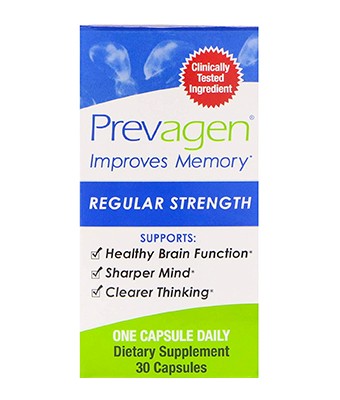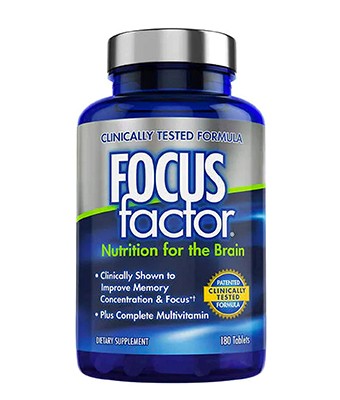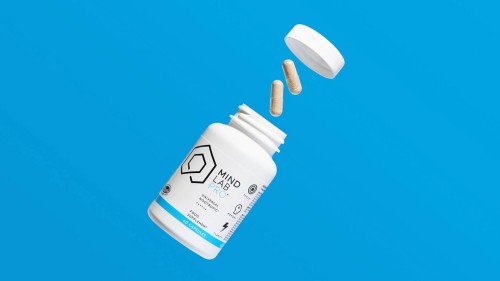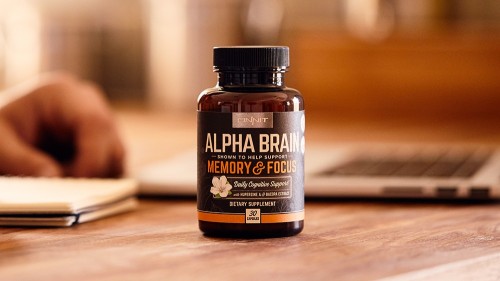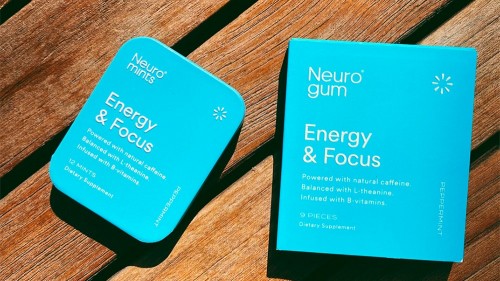WellnessVerge is reader-supported. We may earn a commission when you make a purchase through the links on this page. Learn more about our process here.
Prevagen vs. Focus Factor: Which Is Better?
Published on July 26, 2021
Medically Reviewed by Anthony Dugarte, MD
Prevagen and Focus Factor are two popular brain health supplements with quite different ingredients. If you are looking to improve your memory and brain health, which is best?


Proper brain health is something we may not always focus on as much as our physical health.
But, as we get older, brain health becomes even more important. We strive to preserve our memory, focus, and overall cognitive abilities so we can continue to do the things we love.
Optimal brain health and functioning are heavily influenced by lifestyle factors such as our diet, physical activity level, sleep, stress level, emotions, and how often we “exercise” our minds.
Dietary supplements can complement other lifestyle habits to help keep your brain healthy.
There are several supplements designed to improve brain functioning and reduce cognitive impairments that may develop with age.
In this article, we take an objective look at two popular over-the-counter brain health supplements on the market, Prevagen and Focus Factor.
Quick Facts
| Prevagen | Focus Factor | |
|---|---|---|
| Active Ingredients | Apoaequorin, Vitamin D3 | Vitamin A, vitamin C, vitamin D, vitamin E, thiamin, riboflavin, niacin, vitamin B6, folate, vitamin B12, biotin, pantothenic acid, calcium, iron, iodine, magnesium, zinc, selenium, copper, manganese, chromium, molybdenum, potassium |
| Other Ingredients | Microcrystalline cellulose, vegetable capsule, maltodextrin; 2% or less of casein peptones, lactose, magnesium stearate, modified corn starch, salt, soy peptones, sugar |
Dimethylaminoethanol, L - glutamine, bacopin, L-pyroglutamic acid, phosphatidylserine, docosahexaenoic acid concentrate, choline, inositol, N acetyl tyrosine, bilberry fruit, GABA, Activin, vinpocetine, trace-lyte, huperzine A, boron, vanadium and grape skin extract |
| Cost | About $1.33 per serving | About $0.80–$1.60 per serving, depending on if taking 4 or 8 capsules per day |
| Dose | 1 capsule per day, taken with or without food | 4–8 capsules per day, taken with food |
| Claimed Benefits | Supports brain function, sharper mind, clearer thinking | Increases memory, concentration, and focus |
| Other Forms | Extra Strength, Professional Formula, Chewables | Extra Strength, Chewables for kids |
What Is Prevagen?
Prevagen is a brain health supplement designed to improve memory in older adults. It is considered a nootropic, which is a supplement intended to improve cognition.
It contains two active ingredients: apoaequorin and vitamin D3.
Apoaequorin is the main active ingredient. It is a calcium-binding protein present in a species of bioluminescent jellyfish found in the Pacific Ocean.
Prevagen is available in capsule or chewable form.
It can be found in original strength, extra strength, and professional strength formulations, which vary in the amount of apoaequorin they contain.
This review will be focused on the original strength version of Prevagen.
What Does Prevagen Do?
The makers of Prevagen claim it helps improve signs of mild memory loss associated with aging. It is said to do this by regulating the amount of calcium in brain cells.
Calcium is a mineral that serves as a neurotransmitter. Neurotransmitters like calcium play a role in proper neuron function, communication, and signaling between brain cells.
However, no clinical studies in humans have been performed to assess whether supplementing with apoaequorin produces such results.
The safety and efficacy of apoaequorin have only been assessed in a single study conducted by the makers of Prevagen. (1)
The study found that it’s well-tolerated, and taking it resulted in improvements in verbal learning, working memory, and memory recall compared to a placebo. However, this study was small and is subject to bias.
Any time a study is conducted directly by the manufacturing company and is not peer-reviewed, that is an immediate red flag.
This type of research, even if it is a “gold standard” randomized trial, is likely biased and may have skewed results in their favor.
The lack of unbiased research makes it impossible to know what amount, if any, of apoaequorin is beneficial for brain health.
All formulations of Prevagen also contain 50 mcg of vitamin D3 per serving, which is more than three times the Recommended Dietary Allowance (RDA) for adults aged 19–70 years and more than two times the RDA for adults 71 and up. (2)
Many individuals have low levels of vitamin D3, and there is evidence that low vitamin D is linked to dementia and depression. (3)
The amount in Prevagen can help some adults meet their daily requirements and support mood and brain function.
However, this same amount of vitamin D can also be provided in a single isolated vitamin D supplement.
What Is Focus Factor?
Focus Factor is a brain health supplement designed to improve memory, concentration, and focus. It is also considered a nootropic, a supplement intended to improve cognitive abilities.
It contains a blend of several ingredients reported to support brain health (referred to by the company as neuro-nutrients) and essential vitamins and minerals.
Focus Factor has a line of products for both adults and children. The adult products are available in Original and Extra Strength versions, which differ slightly in their proprietary blend.
There is also a gummy version for children.
The standard dosage for Focus Factor for adults is 4 tablets per day, taken with food.
Depending on other factors, including body weight, activity, stress, and diet, individuals can take up to 8 tablets per day.
This review will focus on the Original Strength adult version.
What Does Focus Factor Do?
The makers of Focus Factor claim that its clinically tested formula improves memory and increases concentration and focus.
Focus Factor contains a large number of ingredients, vitamins, and minerals. However, the manufacturer does not pinpoint which ingredients, in particular, are responsible for the claimed benefits or how.
It does contain the ingredients DHA, choline, and GABA, which may play a role in brain health.
However, the amounts in this supplement are likely much lower than what has been shown in the research to be effective.
A randomized clinical trial was conducted comparing the effectiveness of Focus Factor compared to a placebo in adult men and women. (4)
The company behind Focus Factor, called Factor Nutrition Labs, hired an independent research team to conduct this study.
However, this study did not undergo a peer-review process, nor was it published in a peer-reviewed medical journal. This puts the quality of this study under question.
After 6 weeks, Focus Factor was reported to increase memory recall by 44% and was beneficial for focus and concentration.
This was the only study directly conducted on Focus Factor. However, this study is small in size and is likely biased.
Comparison of Benefits
Both Prevagen and Focus Factor claim to support brain health and slow memory loss, but they work in slightly different ways with different ingredients.
Prevagen claims to support healthy brain function by reducing age-related memory loss.
Specific claims are that it results in clearer thinking and a sharper mind. However, there is no unbiased evidence to support these claims.
The only possible evidence of the effectiveness of Prevagen is from a single study conducted by the manufacturers themselves. (1)
However, since the makers funded the study, the results reported should be taken with a grain of salt.
The vitamin D in Prevagen may help individuals get adequate levels of this nutrient to support brain function. However, a single isolated vitamin D supplement would also serve the same purpose.
Focus Factor also claims to support healthy brain function by counteracting age-associated memory loss.
Focus Factor contains significantly more ingredients than Prevagen, which increases the risk of potential side effects.
Like Prevagen, Focus Factor lacks high-quality research on its effectiveness.
The only randomized clinical trial conducted was directly through the manufacturer, Factor Nutrition Labs. However, this study did not undergo a peer-review process. (4)
While both Prevagen and Focus Factor demonstrated benefits in their research, there is a general lack of non-biased research that is not sponsored by the company for both products.
Comparison of Side Effects and Safety
In comparing Prevagen and Focus Factor, Prevagen wins for safety and has a lower risk of side effects.
Both contain potential allergens such as dairy, soy, and fish. Prevagen contains dairy and soy, while Focus Factor contains soy and fish. If you are allergic to soy, you should avoid both of these products.
Aside from allergens, Prevagen is generally considered safe for most adults and women who are not currently pregnant or breastfeeding.
However, it’s important to note that apoaequorin, the active ingredient in Prevagen, has only been assessed for safety by the makers of Prevagen. (5)
Although they report it was well tolerated in their studies, the findings are also susceptible to bias. (6)
Prevagen also contains 50 mcg of vitamin D per dose. The upper limit, which is the maximum daily amount unlikely to cause adverse effects, is 100 mcg for vitamin D.
Vitamin D can interfere with some prescription medications and make them less potent, such as cholesterol-lowering statins. (7)
Focus Factor has a greater risk for side effects, with some being potentially serious, given its large number of ingredients.
This supplement is not safe for women of childbearing age, pregnant, or nursing.
In a 2018 animal study, the ingredient vinpocetine was associated with adverse reproductive effects, including miscarriage and harmful fetal development. (8)
In 2019, the FDA issued a safety warning for women of childbearing age on the risks of vinpocetine. (9)
The ingredient DMAE also comes with some potential safety concerns. (10)
DMAE-containing products have been associated with adverse effects, though some of these products also contained ephedra (a currently banned substance in the US due to its side effects).
These side effects included worsening mental status, cardiovascular effects, and neurological effects.
Another clinical trial conducted in 2005 found that Bacopa monnieri caused GI symptoms of increased stool frequency, abdominal pain, and nausea. (11)
Inositol is generally safe, only noted to cause mild side effects of nausea, gas, and diarrhea if the dosing was 12 grams per day or higher. (12)
Because Focus Factor contains significantly less than 12 grams of this ingredient, side effects are unlikely to occur.
Other rare but possible side effects in taking Focus Factor include headaches, skin reactions, mild GI upset, sleep disturbance, increased blood pressure, and cerebral hemorrhage. (13, 14)
If you are interested in trying either of these supplements, I highly recommend consulting with a physician to see if they are safe for you.
If I were to choose either supplement, I would choose Prevagen over Focus Factor due to its more positive safety profile.
Cost Comparison
Focus Factor is more affordable than Prevagen per serving if you take the lower dose of 4 tablets per day. However, if you increase the dose to 8 tablets of Focus Factor per day, the price is higher than Prevagen.
Both Prevagen and Focus Factor are available through their official website, Amazon, and retail locations, including drug stores.
Prevagen costs $1.33 per serving, or $39.95 for a 30-day supply. It’s also available for slightly less at $1.25 per serving for a 60-day bottle.
Prevagen is also available in chewable form for adults, which costs the same as tablet form.
For Prevagen Extra Strength or Professional strength versions, the cost increases to $1.83 and $3.00 per serving, respectively.
In comparison, Focus Factor costs 80 cents to $1.60 per serving, depending on if you take 4 or 8 tablets per day.
Focus Factor Extra Strength costs $1.32 to $2.64 per serving, depending on if you take 4 or 8 tablets per day.
The exact price of either can vary depending on which retailer the products are purchased from.
Focus Factor appears to be cheaper than some other brain health supplements, assuming that you stick to the dosing of 4 tablets per day instead of 8.
Our Pick: Choosing Between Prevagen and Focus Factor
Both supplements have come under fire for some of the claims they’ve made regarding brain health.
The Federal Drug Administration and Federal Trade Commission have investigated and charged the makers of Prevagen for claims that violated what is permissible by law for a dietary supplement.
There have been no studies other than the one conducted by the makers of Prevagen to determine the safety and efficacy of apoaequorin.
There are also Consumer Report warnings on Focus Factor regarding the lack of evidence to support taking it.
If I were to choose one over the other, I would choose Prevagen. This is due to Focus Factor’s large number of ingredients and increased risk of mild to severe side effects.
However, since neither supplement formulation has been proven to be effective in high-quality studies, I would recommend focusing more on healthy lifestyle changes to improve brain health first and foremost.
As a Registered Dietitian, I would recommend practicing healthy lifestyle habits to improve your brain health and preserve your memory as long as possible.
Eating a Mediterranean-type diet, engaging in regular physical activity, and getting good quality sleep are all things you can do to improve your brain health without the potential side effects of a supplement.
One particular type of diet, termed the MIND diet, has been shown to be particularly effective in delaying cognitive decline. (15)
If you have concerns about brain health or memory loss, speak with your healthcare provider to rule out more serious concerns.
Always check with a doctor before starting a new supplement to determine what’s best for you.
At WellnessVerge, we only use reputable sources, including peer-reviewed medical journals and well-respected academic institutions.
- Madison Memory Study: A Randomized, Double-Blinded, Placebo-Controlled Trial of Apoaequorin in Community-Dwelling, Older Adults:
https://www.prevagen.com/wp-content/uploads/2017/02/ClinicalTrialSynopsis-cmk816.pdf - Vitamin D Fact Sheet for Health Professionals:
https://ods.od.nih.gov/factsheets/VitaminD-HealthProfessional/ - The Role of Vitamin D in Brain Health: A Mini Literature Review:
https://www.ncbi.nlm.nih.gov/pmc/articles/PMC6132681/ - Evaluation of a Vitamin/Nutraceutical Formulation Designed to Support and Maintain Memory, Concentration and Focus in Healthy Adults:
https://cdn.shopify.com/s/files/1/1774/9147/files/S001._Executive_Summary_of_FOCUSfactor_Clinical_Study_Report.pdf?8914691632562379084 - Safety assessment of Apoaequorin, a protein preparation: subchronic toxicity study in rats:
https://pubmed.ncbi.nlm.nih.gov/23470325/ - Effects of a Supplement Containing Apoaequorin on Verbal Learning in Older Adults in the Community:
https://pubmed.ncbi.nlm.nih.gov/26878676/ - Drug-vitamin D interactions: A systematic review of the literature:
https://www.ncbi.nlm.nih.gov/pmc/articles/PMC5623087/ - Embryo-fetal development studies with the dietary supplement vinpocetine in the rat and rabbit:
https://pubmed.ncbi.nlm.nih.gov/29460393/ - Statement on warning for women of childbearing age about possible safety risks of dietary supplements containing vinpocetine:
https://www.fda.gov/news-events/press-announcements/statement-warning-women-childbearing-age-about-possible-safety-risks-dietary-supplements-containing - COMPOUND SUMMARY Deanol:
https://pubchem.ncbi.nlm.nih.gov/compound/7902 - Bacopa monniera, a reputed nootropic plant: an overview:
https://pubmed.ncbi.nlm.nih.gov/15898709/ - Inositol safety: clinical evidences:
https://pubmed.ncbi.nlm.nih.gov/21845803/ - Ginkgo biloba extract: Mechanisms and clinical indications:
https://www.archives-pmr.org/article/S0003-9993(00)90052-2/fulltext#secd2071398e1048 - Monoamine Oxidase Inhibitors (MAOI):
https://www.ncbi.nlm.nih.gov/books/NBK539848/ - What Are the Components to the MIND Diet?:
https://jandonline.org/article/S2212-2672(15)01251-4/fulltext

